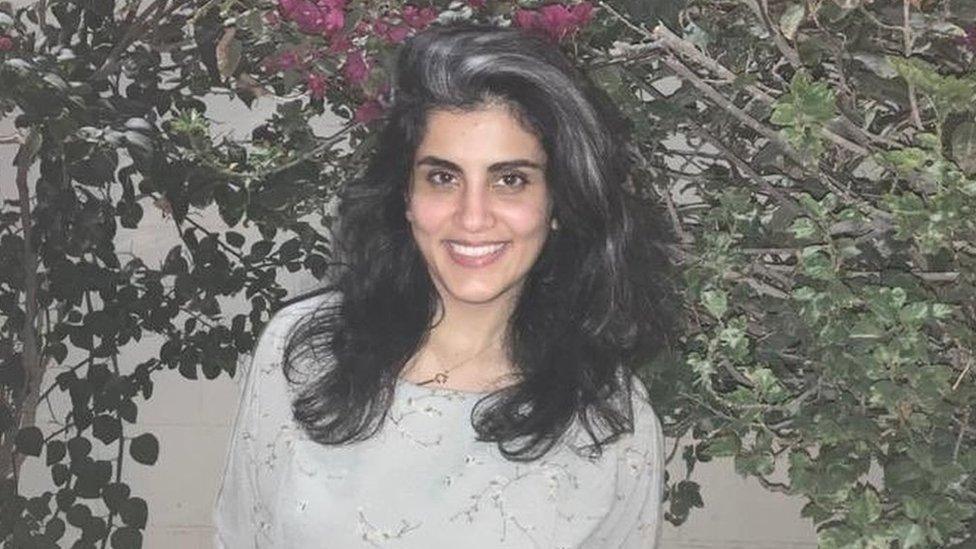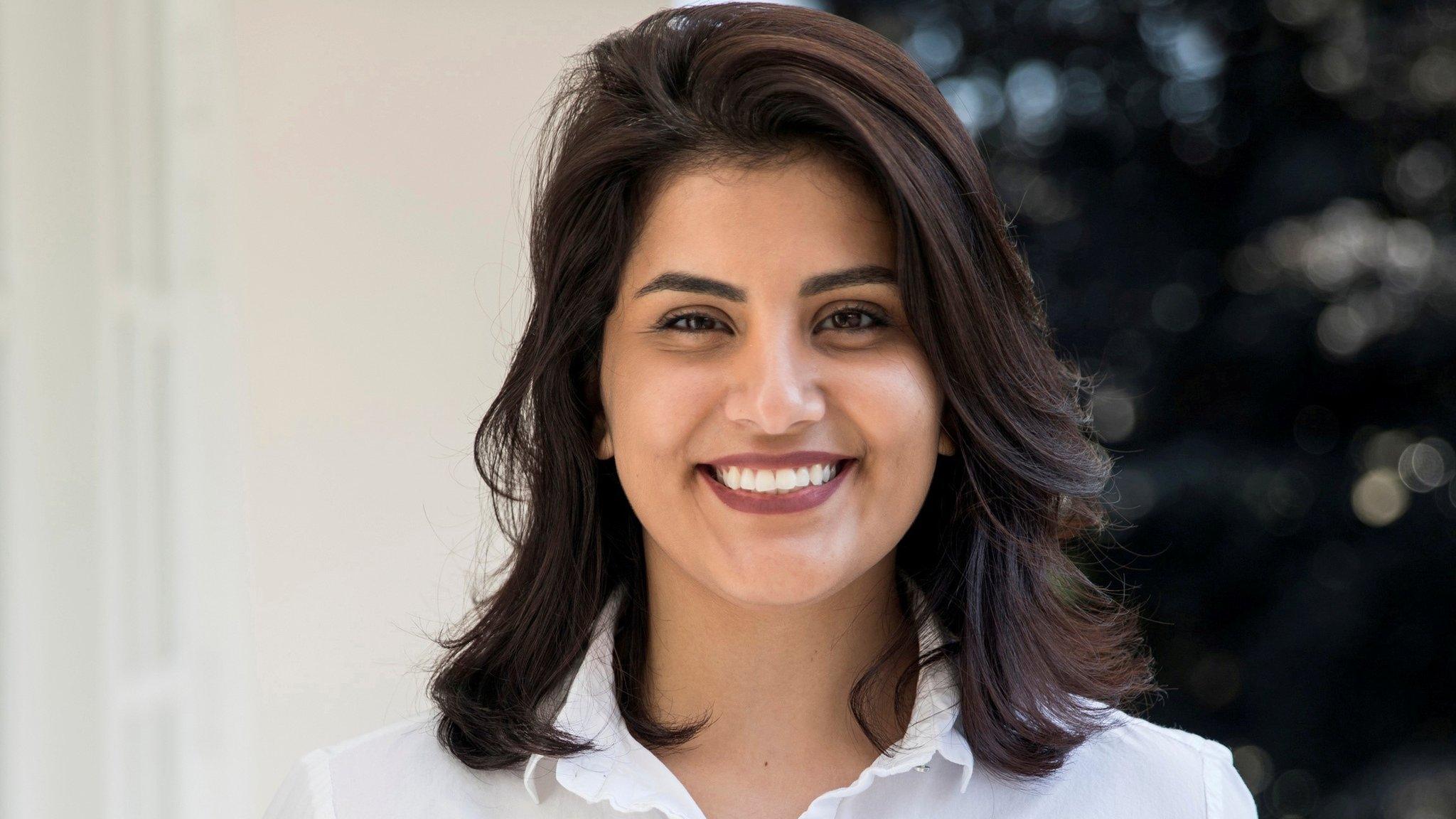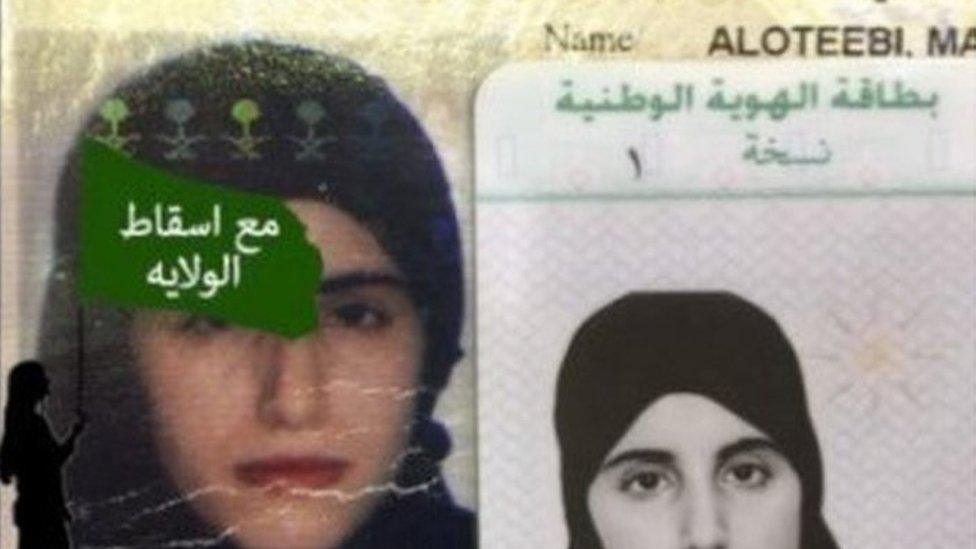Loujain al-Hathloul: Saudi women's rights activist released from prison
- Published

Loujain al-Hathloul's sister, Lina, posted a photograph of the activist following her release on Wednesday
The prominent Saudi women's right activist Loujain al-Hathloul has been released from prison, her family says.
Ms Hathloul, 31, was instrumental in the movement to allow women to drive in the kingdom. She was detained in 2018, just weeks before the ban was lifted.
In December a court found her guilty of seeking to change the political system and damage public order.
She was sentenced to nearly six years in a maximum security prison, but two years and 10 months were suspended.
Her family have warned that she is "not free" and will face numerous restrictions while on probation, including a five-year travel ban.
Allow X content?
This article contains content provided by X. We ask for your permission before anything is loaded, as they may be using cookies and other technologies. You may want to read X’s cookie policy, external and privacy policy, external before accepting. To view this content choose ‘accept and continue’.

"Loujain is at home!!!!!!" Ms Hathloul's sister Lina tweeted on Wednesday, external, breaking the news that she had been released after 1,001 days in prison.
Another sister, Alia, wrote that "this is the best day of my life".
Ms Hathloul became a symbol of the suppression of dissent in Saudi Arabia following her detention in May 2018 along with about a dozen other female activists who had also campaigned for women to be allowed to drive.
Her family said she was initially held incommunicado for three months, and that she was subjected to electric shocks, whippings, and sexual harassment. They also alleged that that she was offered freedom if she agreed to say she was not tortured.
The Saudi government denied the allegations of torture, which her family said were recently dismissed by an appeals court.
Officials also insisted that she was not detained because of her activism, but rather her contacts with foreign diplomats, media and other organisations.
President Joe Biden's national security adviser Jake Sullivan welcomed Ms Hathlouo's release from prison, describing it as "a good thing"., external

Loujain Al-Hathloul has become the face of dissent in the kingdom - a symbol of Saudi Arabia's crackdown on any form of protest.
More than any other female activist languishing in prison, her case has gained global prominence. Her outspoken family and a persistent campaign by human rights groups have kept the spotlight on her.
That's thrown a long dark shadow on the kingdom's efforts to publicise its new economic and social reforms.
Saudi officials say they aren't bowing to outside pressure. But it's also clear they want this issue off the agenda now that there's a new team in the White House emphasising human rights.
This week also saw the announcement of reforms to the Saudi legal system. But there are other issues in this file, including the even longer shadow of the murdered Saudi journalist Jamal Khashoggi. Saudi officials insist their strategic importance in the region will outweigh all other issues.

Ms Hathloul and 10 other women were put on trial at a criminal court in Riyadh in March 2019. However, the case was adjourned several times.
At the end of October 2020, Ms Hathloul started a hunger strike to protest against the conditions of her detention, including not being allowed regular contact with her family.
The following month, her charge sheet was amended and her trial was transferred to a court specialising in handling terrorism cases.
(June 2018) Saudi women hit the road
On 28 December, the Specialised Criminal Court found Ms Hathloul guilty of "acts criminalised according to article 43 of the counterterrorism and terror finance law", Saudi media reported.
The acts allegedly included "inciting change to the basic ruling regime; serving a foreign agenda inside the kingdom by using the internet with the objective of damaging public order; and collaborating with a number of individuals and entities who have committed criminalised acts".
Ms Hathloul denied the charges, but the judge ruled that she had "confessed willingly without being under duress".
And while the judge suspended part of her sentence of five years and eight months, paving the way for her early release, he warned that "if she commits any crimes within the next three years, the suspension will be annulled". He also banned her from leaving Saudi Arabia for five years.
UN experts described the charges as "spurious", external and said Ms Hathloul had merely been exercising her fundamental rights to freedom of expression, peaceful assembly and association.
"Loujain al-Hathloul's release after a harrowing ordeal in prison in Saudi Arabia - lasting nearly three years - is an incredible relief, but long overdue," said Lynn Maalouf, Amnesty International's deputy Middle East director.
"Nothing can make up for the cruel treatment she has suffered, nor the injustice of her imprisonment."
Lina al-Hathloul stressed that "the fight is not over".
"I am not fully happy without the release of all political prisoners," she added.
Related topics
- Published28 December 2020

- Published21 November 2020

- Published13 August 2019

- Published5 August 2019

- Published8 January 2019
